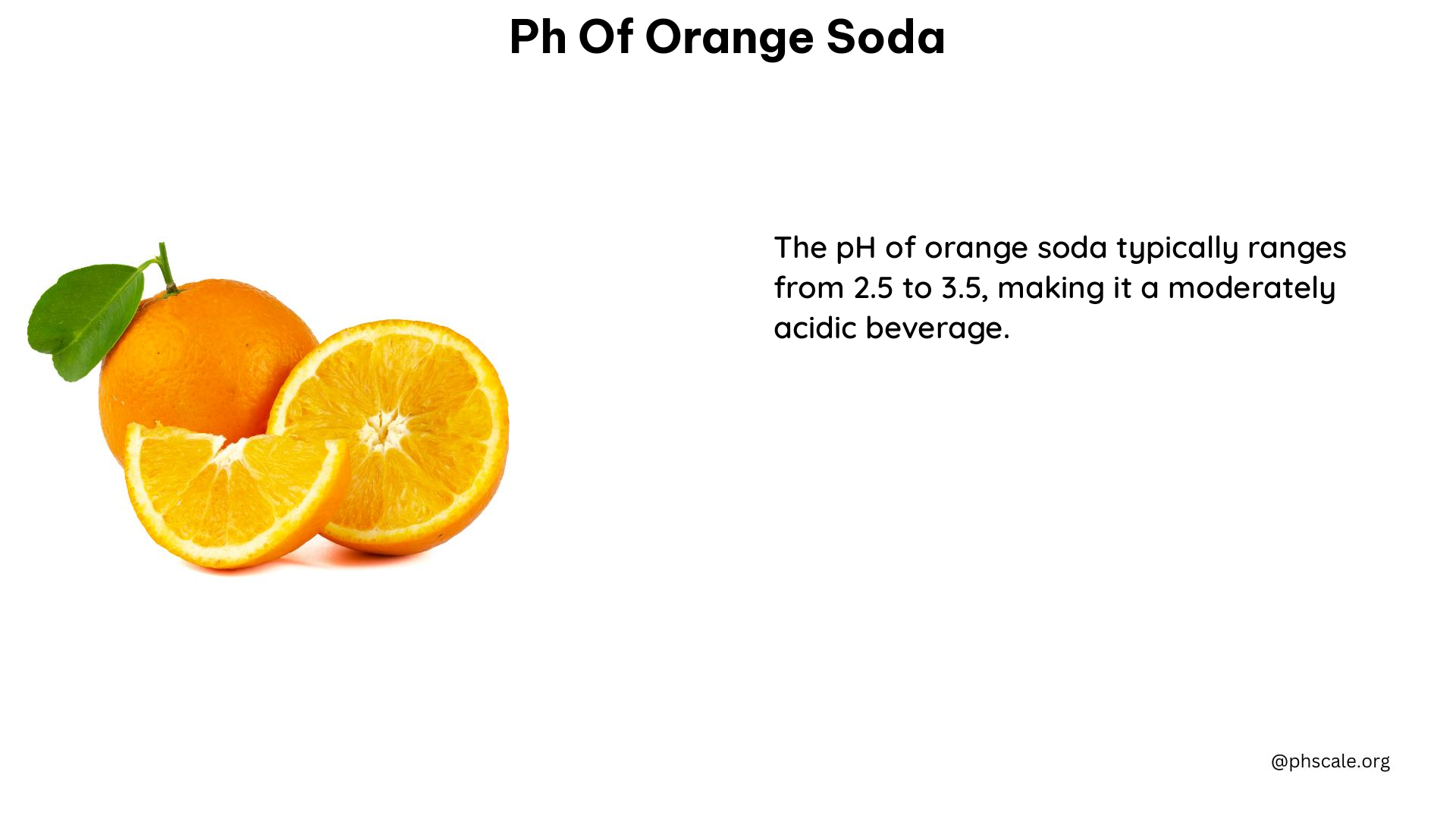The pH value of orange soda varies depending on the specific brand and type, with values ranging from 2.73 to 3.22, indicating that these beverages are generally quite acidic. Understanding the pH levels of orange soda is important for maintaining good oral health and making informed choices about our beverage consumption.
Comparing the pH of Orange Soda to Other Beverages
To put the acidity of orange soda into perspective, let’s compare it to the pH levels of other popular drinks:
| Beverage | pH Value |
|---|---|
| Lemon Juice | 2.25 |
| Coca-Cola Classic | 2.37 |
| Pepsi | 2.39 |
| Sunkist Orange Soda | 2.90 |
| Boylan’s Orange Soda | 3.22 |
| Mountain Dew | 3.30 |
| Water | 7.00 |
As you can see, orange soda is more acidic than some beverages, such as Mountain Dew, but less acidic than others, like Coca-Cola and Pepsi. The low pH levels of these drinks can contribute to tooth erosion and other dental issues if consumed excessively.
Balancing the pH and Maintaining Oral Health

To mitigate the potential negative effects of consuming acidic beverages like orange soda, it’s important to follow these guidelines:
-
Drink in Moderation: Limit your consumption of orange soda and other acidic drinks to minimize the impact on your teeth and overall oral health.
-
Rinse with Water: After drinking orange soda, rinse your mouth with water to help neutralize the acid and prevent it from lingering on your teeth.
-
Use a Fluoride Mouthwash: Incorporating a fluoride-based mouthwash into your oral hygiene routine can help strengthen your tooth enamel and reduce the risk of erosion.
-
Maintain Good Oral Hygiene: Brush and floss regularly to remove any residual acid and prevent the buildup of plaque and bacteria that can lead to tooth decay.
Contaminants and Chemicals in Orange Soda
In addition to its acidic nature, orange soda may also contain various additives and preservatives, including:
- Citric Acid: A common acid used to enhance flavor and preserve the beverage.
- Phosphoric Acid: Another acid used to give the soda its tangy taste.
- Artificial Sweeteners: Some orange sodas may contain artificial sweeteners like aspartame or sucralose.
- Food Coloring: Orange soda often contains artificial coloring to achieve its distinctive color.
These ingredients can further contribute to the overall acidity and potential health concerns associated with consuming orange soda.
Exploring Alternatives to Traditional Orange Soda
If you’re looking to reduce your intake of acidic beverages, there are several alternatives to consider:
-
Natural Fruit Juices: Opt for 100% fruit juices without added sugars or preservatives, which can provide a healthier source of natural sweetness and nutrients.
-
Low-Acidity Beverages: Choose drinks with a higher pH, such as water or milk, which are less likely to cause tooth erosion.
-
Homemade Alternatives: Try making your own orange-flavored drinks using natural ingredients like fresh orange juice, water, and a touch of honey or stevia for sweetness.
By exploring these options, you can enjoy the refreshing taste of orange-flavored beverages while prioritizing your oral health and overall well-being.
Conclusion
The pH of orange soda, typically ranging from 2.73 to 3.22, highlights the acidic nature of these popular fizzy drinks. Understanding the acidity levels and potential health implications is crucial for making informed choices about our beverage consumption. By practicing moderation, maintaining good oral hygiene, and exploring alternative options, we can enjoy the taste of orange soda while prioritizing our dental health.
References
- Studio City Dental Group. (n.d.). pH of waters and sports drinks. Retrieved from https://www.studiocitydentalgroup.com/assets/img/pdf/pHofDrinks.pdf
- The pH of beverages available to the American consumer. (2016). Retrieved from https://www.ncbi.nlm.nih.gov/pmc/articles/PMC4808596/
- Drinks Destroy Teeth. (n.d.). The Unsweetened Truth. Retrieved from https://drinksdestroyteeth.org/the-unsweetened-truth/
- Mark Danner, DMD. (n.d.). Table of Beverage Acidity. Retrieved from https://markdannerdmd.com/downloads/table-beverage-acidity.pdf
- New Albany Smiles. (2023). pH values of Common Beverages. Retrieved from https://newalbanysmiles.com/ph-values-of-common-beverages/.
